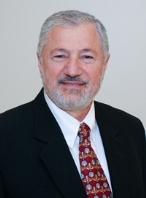
Ramzi Mohammad, Ph.D., professor of Oncology for the Wayne State University School of Medicine and director of Gastrointestinal Cancer Research for the Barbara Ann Karmanos Cancer Institute, and Asfar Azmi, Ph.D., assistant professor of Oncology for the School of Medicine and KCI, are leading a team of more than 30 researchers around the globe to develop a comprehensive review on combination strategies to tackle difficult-to-treat cancers.
Their review is part of the global task force working on identifying combinations of a significant number of non-toxic chemicals, many of which can be found in plants and foods. The substances may help in treating advanced and challenging-to-treat cancers, and may also address the problem of relapse.
While current therapies have achieved modest successes in some cancers, significant problems remain with most traditional therapeutic approaches to treatment, according to the task force. In particular, many newer targeted therapies are extremely expensive, highly toxic and not effective for rare types of cancer and advanced cancers.
Even when these treatments appear to work, a significant percentage of patients will experience a relapse after only a few months. Relapses often occur in advanced, hard-to-treat cancers when small subpopulations of mutated cells become resistant to therapy. Doctors who try to address this problem with combinations of therapies find that therapeutic toxicity typically limits their ability to stop many cancers.
To tackle this problem, a global task force of 180 scientists from prominent institutions in 22 countries was assembled by a Canadian non-government organization called Getting to Know Cancer. Interdisciplinary teams were formed and they nominated a series of high-priority molecular targets -- 74 in total -- that could be reached with chemicals to improve patient outcomes. Corresponding low-toxicity chemical approaches were then recommended as potential candidates for a mixture of chemicals that could reach a broad spectrum of priority targets in most cancer types.
Drs. Mohammad and Azmi were lead authors on one of the interdisciplinary teams studying cancers that are resistant to cell death. Through guidance by Drs. Mohammad and Azmi, the team produced an article titled, "Overcoming Resistance to Apoptosis." This article, along with otherss and capstone information, is available online at the Seminars in Cancer Biology Journal Web site at http://www.sciencedirect.com/science/article/pii/S1044579X15000164.
The task force is now calling for an immediate increase in support for research on chemical mixtures that can reach a broad spectrum of therapeutic targets. There are still many unanswered questions, task force members said, so additional trials are needed to advance this approach before human trials are possible.
"These approaches to therapy are improving, but we need a breakthrough so that we can help scientists address the problem of relapse," Dr. Mohammad said. "This is a new, paradigm-changing approach that might just give us a chance to address this issue.
"The task force also wants to produce an approach to therapy that would have the potential to be very low cost, because many of the latest cancer therapies are deemed unaffordable in low- to middle0income countries," he added. "Accordingly, the task force has laid the groundwork for a solution that should be both inexpensive and effective in making this novel approach available to people who are suffering from cancer throughout the world. We are very excited about the work that the task force has done so far and look forward to tackling some of the major issues when it comes to hard-to-treat cancers, namely ways to prevent relapse and toxicity in patients, as well as bringing the cost down in many treatments."